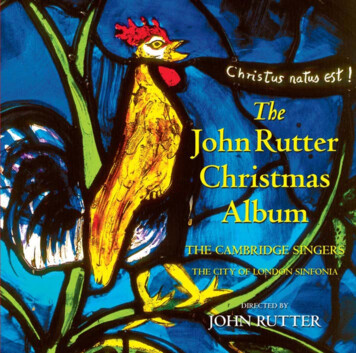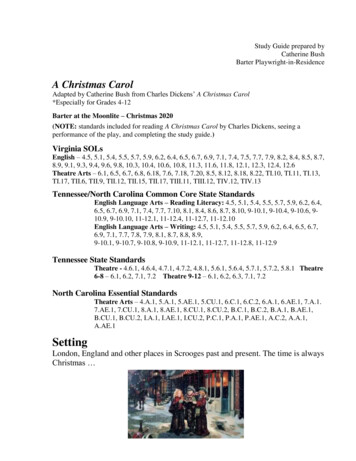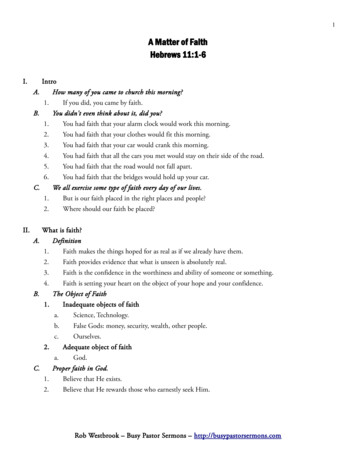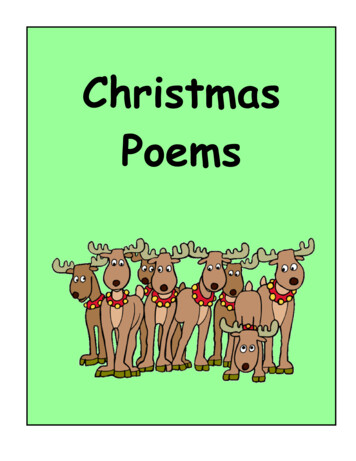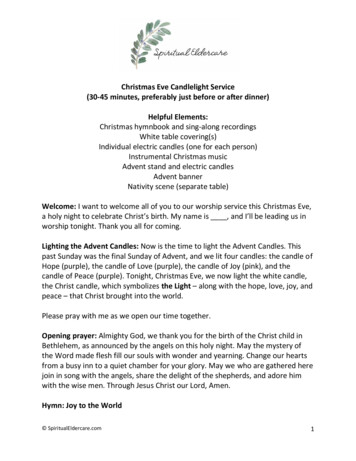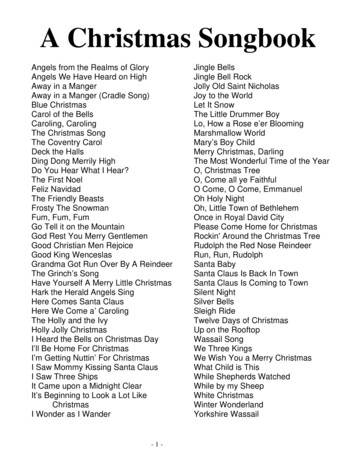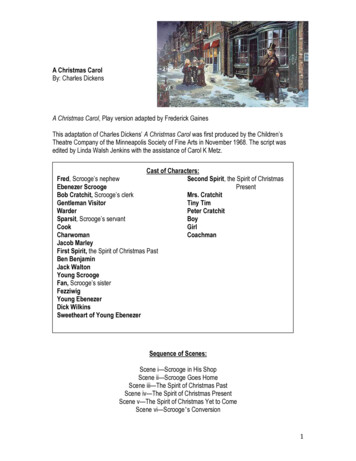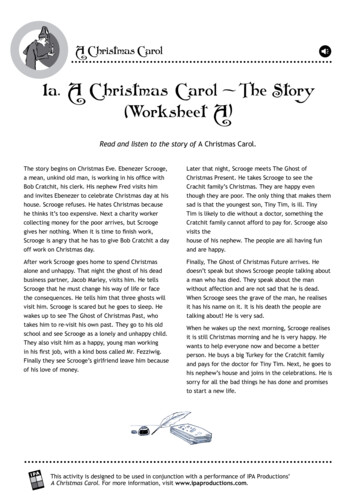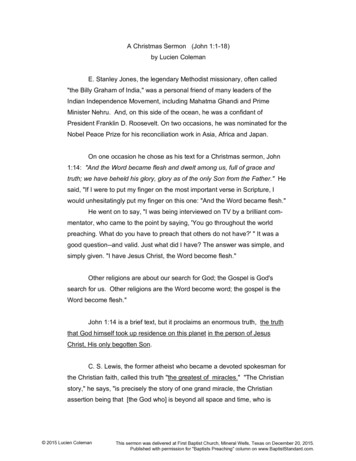
Transcription
A Christmas Sermon (John 1:1-18)by Lucien ColemanE. Stanley Jones, the legendary Methodist missionary, often called"the Billy Graham of India," was a personal friend of many leaders of theIndian Independence Movement, including Mahatma Ghandi and PrimeMinister Nehru. And, on this side of the ocean, he was a confidant ofPresident Franklin D. Roosevelt. On two occasions, he was nominated for theNobel Peace Prize for his reconciliation work in Asia, Africa and Japan.On one occasion he chose as his text for a Christmas sermon, John1:14: "And the Word became flesh and dwelt among us, full of grace andtruth; we have beheld his glory, glory as of the only Son from the Father." Hesaid, "If I were to put my finger on the most important verse in Scripture, Iwould unhesitatingly put my finger on this one: "And the Word became flesh."He went on to say, "I was being interviewed on TV by a brilliant commentator, who came to the point by saying, 'You go throughout the worldpreaching. What do you have to preach that others do not have?' " It was agood question--and valid. Just what did I have? The answer was simple, andsimply given. "I have Jesus Christ, the Word become flesh."Other religions are about our search for God; the Gospel is God'ssearch for us. Other religions are the Word become word; the gospel is theWord become flesh."John 1:14 is a brief text, but it proclaims an enormous truth, the truththat God himself took up residence on this planet in the person of JesusChrist, His only begotten Son.C. S. Lewis, the former atheist who became a devoted spokesman forthe Christian faith, called this truth "the greatest of miracles." "The Christianstory," he says, "is precisely the story of one grand miracle, the Christianassertion being that [the God who] is beyond all space and time, who is 2015 Lucien ColemanThis sermon was delivered at First Baptist Church, Mineral Wells, Texas on December 20, 2015.Published with permission for "Baptists Preaching" column on www.BaptistStandard.com.
uncreated, and eternal, came into human nature, descended into His ownuniverse, and rose again, bringing nature up with Him."Lewis went on to say, "There may be many admirable things whichChristianity shares with all other systems in the world. But, if you take awaythe Incarnation there would be nothing left that is specifically Christian." Andthat was exactly the point on which E. Stanley Jones based that Christmasmessage.During his extensive missionary career, he had come into intimatecontact with Hindus, Sikhs, Moslems, Buddhists and Taoists. And he becamewell-acquainted with all their beliefs.He found that other religions claim inspired writings, visions, miracleworkers & faith healers. "But," he said, "only the Christian faith proclaims thetruth that God came to dwell among us."Theologians refer to this remarkable event as the “incarnation.”(The word comes from the Latin incarnatus, “to be made flesh.”)In the first two verses of John's Gospel, the eternal Christ is referred to as "theWord," a translation of the Greek term, Logos, a concept of central importancein the Bible.In the very first sentence of his Gospel, John says: "the Word was withGod, and the Word was God."Psalm 33:6 echoes this truth, telling us that "the Word" was the agentof creation: "By the word of the Lord the heavens were made, and all theirhost by the breath of his mouth."And this is the truth that John 1:3 proclaims, "all things were madethrough him (i.e., the Word), and without him was not anything made." 2015 Lucien ColemanThis sermon was delivered at First Baptist Church, Mineral Wells, Texas on December 20, 2015.Published with permission for "Baptists Preaching" column on www.BaptistStandard.com.
The Word is also the giver of life. Have you ever noticed that it was byhis word that God breathed life into the dry bones of Ezekiel 37:4? "O drybones," the prophet says, "hear the word of the Lord." And this truth isemphasized again in John 1:4, where John writes, "In him was life, and the lifewas the light of men."Hebrews 1:3 speaks of another remarkable function of the Word.There, the writer declares that the Son of God "upholds the universe by hispowerful word."Paul made the same proclamation in his Colossian letter: "all thingswere created through him and for him. He is before all things, and in him allthings hold together" (Col. 1:16-17).John begins his Gospel with a truth of enormous importance, a truththat is foundational to our Christian faith: "In the beginning was the Word, andthe Word was with God, and the Word was God." That is to say, beforeanything was created--before the universe itself came into being--the Wordalready existed.So, when John writes in v. 14, "And the word became flesh and dweltamong us," he is referring to much more than the babe in a manger, "gentleJesus, meek and mild." He is referring to the self-revelation of God himself."The "good tidings of great joy" in Luke 2:10 is that this Word,this Word who was in the beginning, through whom all things were created,and who holds the universe together-- this Word "became flesh and dweltamong us.""But why? Why did this exalted Word come to dwell among us? Whywas the incarnation necessary? 2015 Lucien ColemanThis sermon was delivered at First Baptist Church, Mineral Wells, Texas on December 20, 2015.Published with permission for "Baptists Preaching" column on www.BaptistStandard.com.
Imagine that you are watching a bee crawl about on the petals of aflower, and suppose you wanted to reveal yourself to that bee--your thoughts,your feelings, your personality. How could you possibly go about it?You would be facing more than a language problem. Because, even ifthe bee could comprehend the meaning of your words, he still wouldn't beable to understand you--your joys and griefs, your aspirations and fears, yourfuture hopes and past recollections--these things would be beyond hiscomprehension, because you are an entirely different kind of creature, adifferent order of being.But, there might be one possibility, one way to make yourselfunderstood. You might communicate with that bee if you could becomea bee.However, you would face yet another problem. How would you thenconvince him that you were not merely a bee, that you were something morethan a bee?John is referring to such a problem in John l:10, where he writes:"He was in the world, and the world was made through him, yet the worldknew him not."Some of you might remember the dramatic event that took place inMidland, Texas, back in 1987, when little Jessica McClure, just an 18 monthold toddler, was finally rescued after being trapped in a deep, narrow wellshaft for 58 hours.Television viewers all over the world watched on CNN as RobertO'Donnell, a fire department paramedic, went down into that 22-foot hole atthe risk of his own life and brought the little girl to the surface in his arms. 2015 Lucien ColemanThis sermon was delivered at First Baptist Church, Mineral Wells, Texas on December 20, 2015.Published with permission for "Baptists Preaching" column on www.BaptistStandard.com.
That is a symbol of the incarnation. In the person of Jesus Christ, Godcame down into the pit of human existence in order to bring us out of darknessinto the light.When E. Stanley Jones, delivered that Christmas sermon I referred toat the beginning, he closed his message by saying: "And the Word becameflesh. That is, indeed, good tidings of great joy.” Then he added, “But theworld will never know it unless the Word becomes flesh in my life and yours,time and time again."That can happen when we respond to the invitation in John 1:12:"But to all who received him,who believed in his name, he gave power tobecome the children of God."If you will give yourself to Him, he will give himself to you. That is God'sanswer to the question, "What shall I DO about Christmas?" 2015 Lucien ColemanThis sermon was delivered at First Baptist Church, Mineral Wells, Texas on December 20, 2015.Published with permission for "Baptists Preaching" column on www.BaptistStandard.com.
On two occasions, he was nominated for the Nobel Peace Prize for his reconciliation work in Asia, Africa and Japan. On one occasion he chose as his text for a Christmas sermon, John 1:14: "And the Word became flesh and dwelt among us, full of grace and truth; we have beheld his glory, glory

